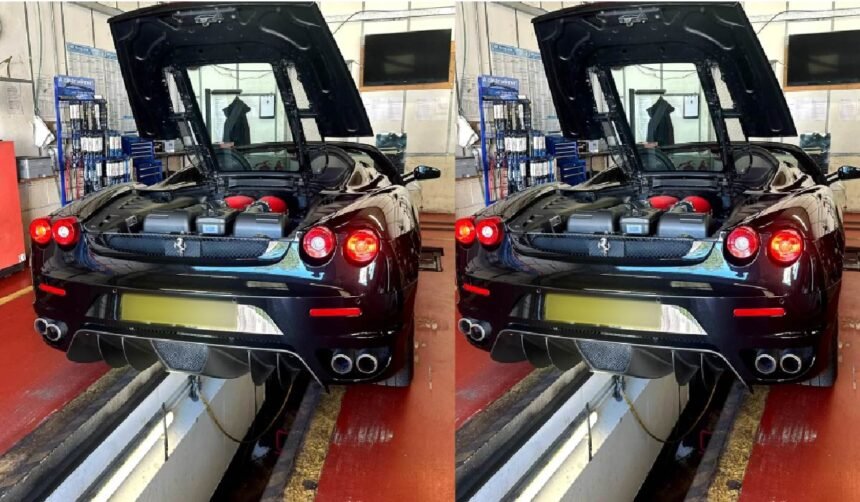If your car is making unusual noises, losing power, or showing warning lights, the issue could be due to poor maintenance, and the solution is professional car servicing. Once your car is properly inspected and all issues are addressed with care, it will rock on the road like never before. Car service involves three major types: interim, full, and major service.
Each includes a comprehensive and customised inspection, tailored to the service you choose. Failing to service your car on time may result in the development of major issues, such as brake and engine problems, which can be both dangerous and costly. If you are in Aldershot and need a car service nearby, don’t hesitate to contact Gforce Tyres. You can have both same-day and next-day slots available in case you need a full, interim, or major car service in Aldershot.
Difference Between Interim, Full, And Major Car Service
Full service is intended to cover a thorough inspection of your vehicle and perform all necessary maintenance on the spot. A full car service is recommended after completing 12000 miles or after one year of driving.
An interim service is recommended for high-mileage drivers who drive more frequently. It is less comprehensive than a full service, which is recommended after completing 6,000 miles or 6 months.
On the other hand, a major car service involves a more thorough inspection of your car, recommended after every 24,000 miles and after completing two years of driving. Here is a breakdown of all services included and those that are not.
| Aspect | Interim Service | Full Service | Major Service |
| Service Frequency | Every 6 months or 6,000 miles (whichever comes first) | Every 12 months or 12,000 miles (whichever comes first) | Usually every 24 months or 24,000 miles (varies by manufacturer) |
| Ideal For | High-mileage drivers or in-between annual services | Annual maintenance for most vehicles | Comprehensive check, ideal for older cars or after 2 years without service |
| Number of Checks | Around 35–40 checks | Around 60–80 checks | 80+ checks including major components and replacements |
| Engine Oil & Filter Change | ✔ Included | ✔ Included | ✔ Included |
| Brake Inspection | Basic visual check | Comprehensive check and adjustment | Full inspection plus possible brake fluid flush/change |
| Tyres | Pressure & tread check | Pressure, tread, wear pattern, and rotation check | Full tyre and wheel inspection, alignment check if needed |
| Steering & Suspension | Basic inspection | Full inspection for wear and damage | Detailed inspection, including steering components and bushings |
| Lights & Indicators | ✔ Checked | ✔ Checked | ✔ Checked |
| Fluid Top-Ups | Only essential fluids | Full top-up (coolant, brake fluid, power steering, etc.) | Complete fluid flush and replacement if needed (coolant, brake, transmission, etc.) |
| Air Filter Replacement | ✘ Not included (unless requested) | ✔ Usually included | ✔ Included |
| Cabin/Pollen Filter | ✘ Not included | ✔ Often included | ✔ Included |
| Fuel Filter (Diesel only) | ✘ Not included | ✔ Often included | ✔ Included (or replaced as per schedule) |
| Spark Plugs (Petrol only) | ✘ Not included | ✔ May be included depending on mileage | ✔ Usually included or replaced |
| Battery Condition Check | ✔ Basic check | ✔ Detailed test | ✔ Detailed test and potential replacement |
| Service Book Update | ✔ | ✔ | ✔ |
| Additional Tasks | — | — | Timing belt replacement, major component inspection, emission checks, extensive system diagnostics |
| Overall Cost | Lower cost | Moderate cost due to more parts and labour | Highest cost due to extensive work and parts |
| Best Use Case | Budget-friendly check-up or before a long trip | Thorough annual maintenance | Major maintenance for ageing vehicles or after long service gaps |
Common Car Problems You Might Face
1. Engine Overheating
Cause: Low coolant levels, worn-out hoses, faulty thermostats, or a blocked radiator.
Signs to Watch:
- Rising temperature gauge on the dashboard
- Steam or smoke coming from under the bonnet
- Sweet smell (coolant leak) inside or outside the vehicle
- Engine warning light or overheating indicator
- Poor heater performance inside the car
Why It Happens: Over time, coolant can degrade or leak, hoses can become brittle, and air pockets can form in the cooling system, especially in older cars or those driven long distances.
Service Solution: A full service includes checking coolant levels, inspecting hoses, and flushing the radiator system when necessary. These steps help prevent costly engine repairs or the need for a complete engine replacement.
Why It Matters: Engine overheating can cause severe damage including warped cylinder heads, blown head gaskets, or even complete engine failure. Addressing cooling system issues early prevents costly repairs and keeps your engine running smoothly.
2. Brake System Failure
Cause: Worn brake pads, leaking fluid, or warped discs.
Why It Happens: Regular use causes brake pads and discs to wear down naturally over time. Leaks in the brake fluid system reduce hydraulic pressure, while heat buildup can warp discs, all of which compromise braking efficiency. Lack of regular maintenance accelerates these issues.
Signs to Watch:
- Squealing or grinding noises when braking
- Reduced braking responsiveness or longer stopping distances
- Brake warning light illuminated on the dashboard
- Pulsating or vibrating brake pedal
- Soft or spongy brake pedal feel
Service Solution: A standard car service includes checking brake pad thickness, topping up fluid, and identifying early wear or damage in discs and callipers.
Why It Matters: Brake issues are not just inconvenient; they’re dangerous. You face risks such as longer stopping distances, grinding noises, or total brake failure.
3. Battery Problems
Cause: Weak charge, corroded terminals, or aging battery cells.
Why It Happens: Over time, carbon deposits build up inside the engine due to incomplete combustion, and air or fuel filters become clogged with dirt and debris. This restricts airflow and fuel flow, causing the engine to misfire or run inefficiently.
Signs to Watch:
- Slow or difficult engine start
- Dim headlights or dashboard lights
- Clicking sound when turning the key
- Corrosion or buildup around battery terminals
- Electrical issues like flickering lights or malfunctioning accessories
Service Solution: A technician will test your battery voltage, check for corrosion, and evaluate the remaining life. If it’s on its way out, they’ll recommend a replacement before it lets you down, saving you from a no-start situation.
Why it matters: A failing battery can leave you stranded unexpectedly, especially in cold weather or after your car has been sitting unused. Regular checks help avoid inconvenient breakdowns and ensure your vehicle starts reliably every time.
4. Engine Misfires or Poor Performance
Cause: Dirty spark plugs, clogged filters, or fuel system buildup.
Why It Happens: Neglected engines accumulate carbon deposits, and filters lose effectiveness over time.
Signs to Watch:
- Rough idling or engine vibrations
- Loss of power or hesitation during acceleration
- Increased fuel consumption
- Engine warning light on the dashboard
- Difficulty starting the engine
- Unusual exhaust smoke or smell
Service Solution: During routine servicing, mechanics replace air filters, inspect or change spark plugs, and clean the fuel system, thereby restoring engine power, improving fuel economy, and ensuring smooth idling.
Why it matters: Ignoring engine misfires or poor performance can lead to increased fuel consumption, higher emissions, and potential engine damage, which could result in costly repairs and reduced vehicle reliability. Addressing these issues early helps maintain optimal performance and saves money in the long run.
5. Transmission Issues
Cause: Dirty or low transmission fluid, worn clutch, or gearbox damage.
Why It Happens: Over time, transmission fluid can become contaminated or leak, reducing its ability to lubricate and cool vital components. Regular wear and tear on the clutch or internal gearbox parts can also lead to shifting problems and transmission failure.
Signs to Watch:
- Difficulty shifting gears or slipping gears
- Delayed or rough gear engagement
- Unusual whining or clunking noises from the gearbox
- Transmission warning light on the dashboard
- Transmission fluid leaks under the vehicle
- Burning smell coming from the transmission area
Service Solution: A regular service includes transmission fluid checks and a visual inspection of the gearbox. Early detection helps prevent expensive repairs and keeps the shifting smooth.
Why It Matters: Transmission problems can cause poor gear changes, slipping, or complete failure, which can leave you stranded and lead to costly replacements. Timely maintenance ensures reliable performance and extends the lifespan of your vehicle’s transmission system.
6. Uneven Tyre Wear and Misalignment
Cause: Misaligned suspension, incorrect tyre pressure, or worn suspension parts.
Why It Happens: Over time, driving on rough roads, hitting potholes, or normal wear causes suspension components to shift or wear unevenly. Incorrect tyre pressure also contributes to uneven contact with the road surface, accelerating wear on certain parts of the tyre.
Signs to Watch:
- Visible uneven tread wear on tyres
- Car pulls to one side while driving
- Steering wheel vibration or shaking
- Steering wheel not centered when driving straight
Service Solution: A professional service includes tyre inspection, pressure check, and alignment correction, ensuring even wear and safer handling.
Why It Matters: Uneven tyre wear reduces grip, increases fuel usage, and shortens tyre lifespan.
7. Suspension and Steering Wear
Cause: Worn shocks, leaking struts, or damaged bushings.
Why It Happens: Regular driving over uneven roads, potholes, and general wear and tear cause suspension parts like shocks and bushings to degrade or leak over time. Lack of maintenance accelerates this process, affecting the vehicle’s stability.
Signs to Watch:
- Vehicle pulling to one side
- Bouncy ride
- Knocking sounds over bumps
Service Solution: Full servicing includes thorough checks of suspension components and steering systems for wear and tear. Addressing these issues early ensures better ride quality and improved vehicle control.
Why It Matters: Faulty suspension or steering compromises safety by reducing your ability to control the vehicle, increasing stopping distances, and causing uneven tyre wear. Timely repairs maintain comfort, safety, and extend the life of other vehicle components.
What are the Benefits of Regular Car Servicing?
Regular servicing not only keeps your vehicle in peak condition but also saves you money in the long run. Book vehicle servicing in Aldershot today with Gforce Tyres and enjoy a smoother, safer drive. Plus, a well-maintained vehicle holds a higher resale value, making it a smart long-term investment.
Why Choose Gforce for Your Next Car Service in Aldershot?
When it comes to trusted car service in Aldershot, Gforce stands out for precision, honesty, and expert care. Whether it’s a routine oil change or a comprehensive diagnostic inspection, our qualified technicians utilise advanced tools and high-quality parts to keep your car in optimal condition.
We’re not just ticking boxes; we’re preventing costly breakdowns, enhancing performance, and keeping your car safe year-round. Don’t wait anymore, book your service now!
Conclusion
Preventing car trouble is always smarter and cheaper than reacting to it. Routine servicing helps catch wear and tear early, saving you time, money, and stress in the long run.
Need a reliable garage in Aldershot? Gforce Tyres offers comprehensive car servicing and repairs to keep your vehicle running smoothly.
Call now, or book online to keep your vehicle road-ready all year long.
FAQs
1. How often should I service my car?
Most manufacturers recommend servicing your car every 12 months or 12,000 miles, whichever comes first. However, this can vary based on your car’s make, model, and driving habits. Always check your owner’s manual for specific intervals.
2. Can I do some maintenance myself?
Yes, you can handle basic tasks like checking tyre pressure, topping up fluids, replacing wiper blades, or changing air filters. However, for safety-critical systems like brakes or engine diagnostics, it’s best to leave it to professionals.
3. What happens if I don’t service my car regularly?
Skipping regular services can lead to reduced performance, poor fuel efficiency, breakdowns, and costly repairs. It may also void your warranty and reduce your vehicle’s resale value.
4. How long does a typical service take?
A basic/interim service usually takes 1–2 hours, while a full service can take up to 3 hours. Times may vary depending on the vehicle type and any additional issues found during inspection.









